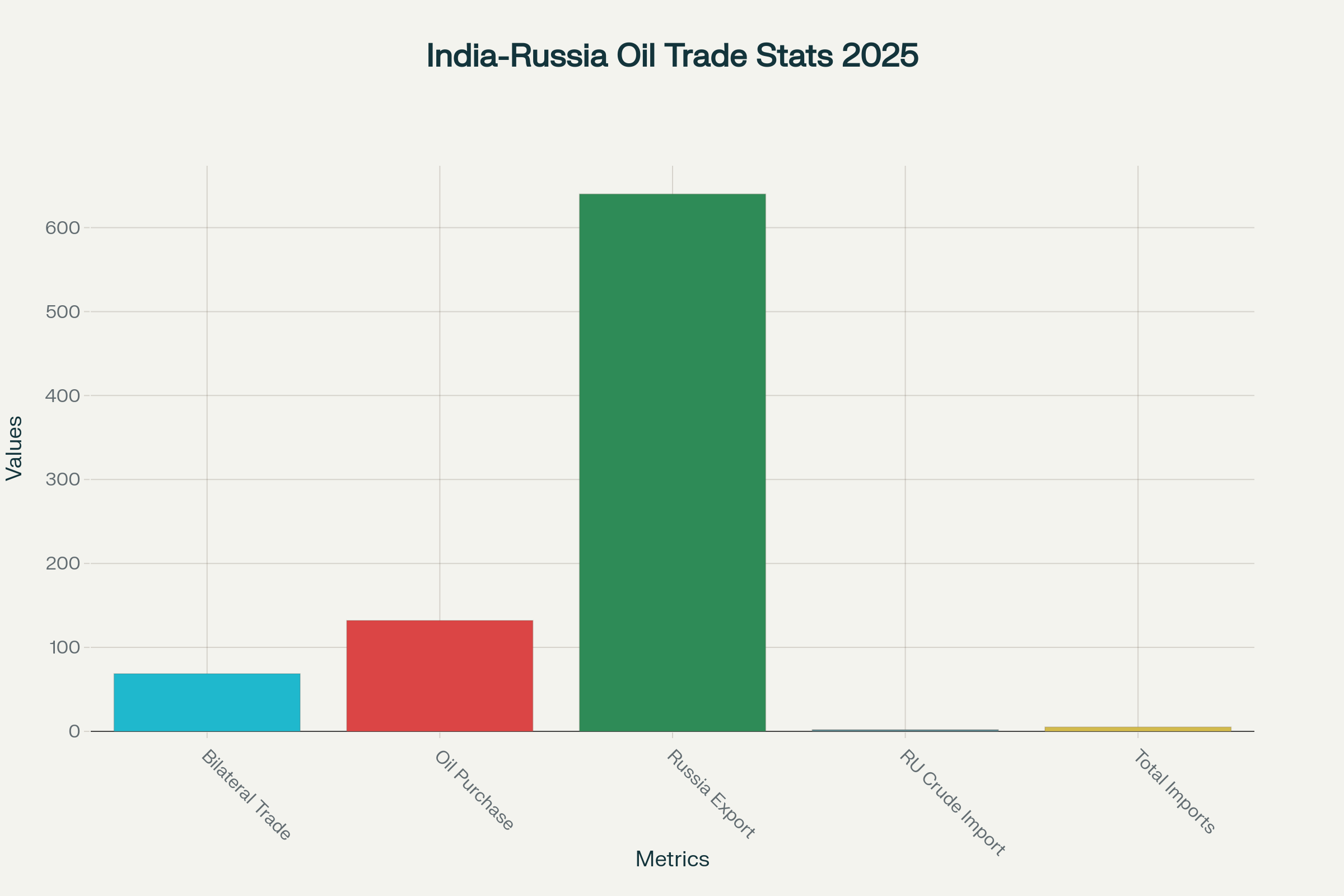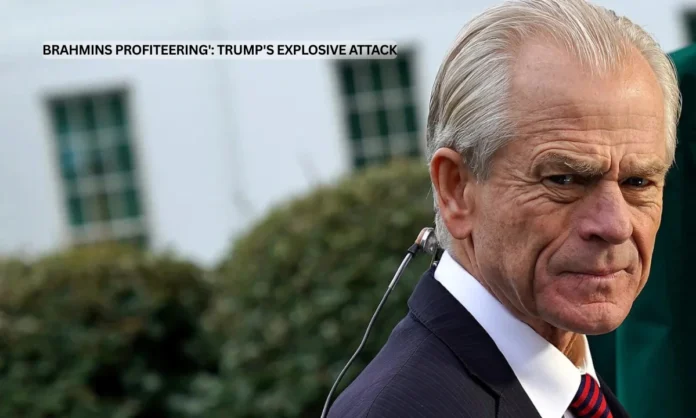Key Highlights
- Peter Navarro accused India of operating as a “laundromat for the Kremlin” through Russian oil trade during Fox News interview
- India purchased ₹132 billion worth of Russian oil since the Ukraine war, representing 20% of Russia’s total oil export earnings
- Trump administration imposed up to 50% additional tariffs on Indian exports as punishment for continued Russian oil purchases
Opening Overview
The India-Russia oil trade relationship has emerged as a major flashpoint in U.S.-India diplomatic relations, with Trump administration officials launching unprecedented verbal attacks against New Delhi’s energy policies. President Trump’s Trade Advisor Peter Navarro escalated tensions by describing India as nothing more than a “laundromat for the Kremlin,” specifically targeting the country’s elite “Brahmins” for allegedly profiteering from discounted Russian crude purchases.
This diplomatic confrontation centers on India’s strategic decision to significantly increase India-Russia oil trade since the Ukraine conflict began in early 2022. Navarro’s inflammatory comments came during Prime Minister Modi’s high-profile visit to China for the Shanghai Cooperation Organisation summit, where he met Chinese President Xi Jinping for the first time in seven years. The timing of these remarks underscores the growing complexity of global energy geopolitics and the challenges facing nations seeking energy security amid geopolitical pressures.
The India-Russia oil trade controversy reflects broader questions about economic sovereignty versus Western sanctions compliance, as New Delhi continues to defend its right to pursue independent energy policies while managing mounting pressure from Washington.
India’s Strategic Energy Partnership with Russia Transforms Global Oil Dynamics
- Russia has become India’s largest crude oil supplier, providing approximately 1.7 million barrels per day in 2025
- India’s oil imports from Russia generated $12.6 billion in savings over 39 months through discounted pricing
- The India-Russia trade relationship reached a record $68.7 billion in fiscal year 2024-25
India’s India-Russia oil trade relationship underwent a dramatic transformation following Russia’s invasion of Ukraine in February 2022. Before the conflict, Russia supplied merely 100,000 barrels per day to India, representing less than 3% of the country’s total crude imports. However, Western sanctions created unprecedented opportunities for Indian refiners to access heavily discounted Russian crude oil.
By 2025, Russia maintains its position as India’s leading oil supplier, providing approximately 1.7 million barrels per day on average. This surge displaced traditional suppliers from Africa and the Americas while allowing Middle Eastern producers like Iraq, Saudi Arabia, and the UAE to maintain their market share through competitive pricing strategies.
The India-Russia oil trade expansion generated substantial financial benefits for Indian refiners, with official trade data analysis indicating savings of at least $12.6 billion over 39 months compared to crude from other countries. These savings, while significant, narrowed considerably over time as global markets adjusted to new supply dynamics. Russian crude currently satisfies approximately 40% of India’s oil demands, establishing the country as the largest importer of seaborne Russian crude globally.
| Metric | Value | Source |
|---|---|---|
| India-Russia Bilateral Trade (2024-25 Fiscal Year) | $68.7 billion | Foreign Ministry |
| India’s Purchase of Russian Oil since Ukraine War | ₹132 billion | CREA Analysis |
| Russia’s Total Oil Export Earnings since Ukraine War | ₹640 billion | CREA Analysis |
| India’s Russian Crude Oil Imports (Million Barrels per Day, 2025) | 1.7 million bpd | Trade Analytics |
| India’s Total Crude Oil Imports (Million Barrels per Day, 2025) | 4.55 million bpd | Petroleum Ministry |
| India’s Oil Savings from Russian Purchases (39 months) | $12.6 billion | Official Trade Data |

Key official statistics on India-Russia oil trade and crude oil imports in 2025
Economic Impact and Trade Imbalance Challenges
- Bilateral trade between India and Russia reached $68.7 billion in fiscal 2024-25, creating a $59 billion trade deficit
- India purchased ₹132 billion worth of Russian oil since the Ukraine war began, representing 20% of Russia’s total oil export earnings
- Indian refiners increased Russian oil purchases by 10-20% in September 2025 despite U.S. pressure
The India-Russia oil trade relationship has fundamentally altered the bilateral economic landscape between the two nations. Official data from the Centre for Research on Energy and Clean Air reveals that India purchased approximately ₹132 billion (about $13.39 lakh crore) worth of Russian oil since early 2022, accounting for one-fifth of Russia’s ₹640 billion oil export earnings during this period.
This massive energy trade created significant economic imbalances. For the fiscal year ending March 2025, India-Russia oil trade contributed to bilateral trade reaching an unprecedented $68.7 billion, with India facing a substantial $59 billion trade deficit largely driven by rising oil imports. The trade disparity highlights India’s challenge in expanding exports to Russia, particularly in sectors like pharmaceuticals, agricultural products, and textiles.
Russian oil purchases represented strategic economic calculations for Indian refiners. In June 2025 alone, India exported merely $316 million worth of goods to Russia while importing $4.74 billion, creating a monthly trade deficit of $4.42 billion. The India-Russia oil trade dynamics demonstrate how energy security considerations can reshape traditional trading relationships, even as they create new economic dependencies and geopolitical vulnerabilities.
Trump Administration’s Tariff Response and Diplomatic Pressure Campaign
- U.S. imposed up to 50% additional tariffs on Indian exports, among the steepest levied by Washington
- Indian refiners plan to boost Russian oil imports by 10-20% in September 2025 despite American pressure
- Indian officials maintain their stance to continue Russian oil procurement without government restrictions
The Trump administration launched an aggressive campaign against India-Russia oil trade through both economic punishment and diplomatic pressure. Washington imposed additional tariffs of up to 50% on Indian exports, representing some of the steepest trade penalties ever levied against New Delhi. These punitive measures became effective on August 27, 2025, directly targeting India’s strategic energy decisions.
Peter Navarro’s Fox News interview represented the most inflammatory attack yet, using culturally loaded language about “Brahmins profiteering at the expense of the Indian people”. The Trump administration’s rhetoric intensified as India demonstrated remarkable resilience against American pressure, with trading sources reporting that Indian refiners would increase Russian oil purchases by 10-20% in September 2025.
Despite mounting U.S. pressure, Indian officials and refinery executives maintained their defiant stance. The India-Russia oil trade relationship proved resilient to external pressure, with Indian refiners continuing to prioritize energy security and economic benefits over diplomatic considerations. Indian Oil Ministry officials explicitly stated that no government directive existed to reduce purchases from Russia, emphasizing India’s commitment to strategic autonomy.
India’s Diplomatic Response and Strategic Autonomy Assertions
- Foreign Minister Jaishankar emphasized India-Russia relationship as one of the most consistent global partnerships since World War II
- India accused the U.S. and EU of hypocrisy while they continue engaging in considerable trade with Russia
- New Delhi seeks to boost exports to Russia in pharmaceuticals, agriculture, and textiles to address trade imbalances
India’s response to U.S. pressure over India-Russia oil trade reflects the country’s broader commitment to strategic autonomy in international relations. Foreign Minister Subrahmanyam Jaishankar, during his August 2025 visit to Moscow, characterized the India-Russia relationship as among the “most consistent of major global partnerships since World War II,” emphasizing the deep historical foundations underlying current energy cooperation.
Indian officials consistently defended their India-Russia oil trade policies by highlighting Western double standards. Petroleum Minister Hardeep Singh Puri argued that India “has not broken any rules” and maintained compliance with G-7 price-cap mechanisms designed to limit Moscow’s revenues while keeping crude flowing. This diplomatic strategy aimed to legitimize India’s position by exposing inconsistencies in Western sanctions enforcement.
The Indian government pursued diversification strategies to address trade imbalances while maintaining India-Russia oil trade volumes. Plans include increasing exports of pharmaceuticals, agricultural products, and textiles to Russia, alongside initiatives to send skilled Indian workers in information technology, construction, and engineering to address Russia’s labor shortages. These comprehensive economic engagement strategies demonstrate India’s intention to deepen bilateral ties beyond energy trade, despite mounting international pressure.
Closing Assessment
The India-Russia oil trade controversy represents a defining moment in contemporary international relations, highlighting the complex intersection of energy security, economic sovereignty, and geopolitical alignment. India’s unwavering commitment to maintaining its Russian energy partnership, despite unprecedented U.S. pressure and inflammatory diplomatic rhetoric, demonstrates the limitations of Western sanctions policies in compelling major economies to abandon strategic interests.
Peter Navarro’s harsh characterization of India as a “Kremlin laundromat” and his culturally insensitive references to “Brahmins profiteering” may have irreparably damaged U.S.-India relations, particularly given the timing during Prime Minister Modi’s diplomatic tour of China. The India-Russia oil trade relationship has proven resilient to external pressure, with Indian refiners continuing to increase Russian crude purchases even as Washington imposed severe economic penalties.
This diplomatic crisis ultimately reflects broader questions about the future of global energy markets and the effectiveness of sanctions-based foreign policy approaches. India’s successful defense of its India-Russia oil trade policies may encourage other nations to prioritize economic pragmatism over geopolitical alignment, potentially weakening Western efforts to isolate Russia’s war economy. The long-term implications extend far beyond bilateral trade statistics, potentially reshaping the fundamental architecture of international economic cooperation and energy security strategies for years to come.


